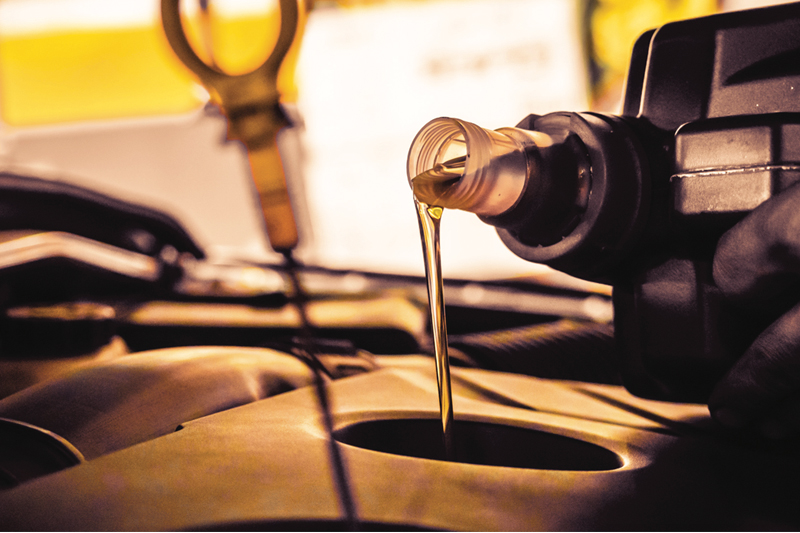
Andrew Goddard, Chairman of the Verification of Lubricant Specifications (VLS), explains the increasing complexity around 5w30 engine oils, and how motor factors can make the right stock selection.
Engine technology has evolved significantly over recent years. Just as modern engines are becoming even more sophisticated, engine oil is becoming increasingly complex, too. The strive for reduced emissions, demand for greater performance and better fuel economy, and the introduction of hybrid and electric vehicles have all placed new demands on lubricants. Smaller engines are running at higher temperatures to maximize efficiency, power output and fuel economy. Longer oil drain intervals, taken together with smaller sumps, have created the need for less viscous, synthetic oils to provide the lubrication required in these challenging conditions.
Lubricants manufacturers have had to adapt. As a result, there has been a general trend to lower the viscosity of lubricants. Where historically a vehicle would have used a 15w40 or 10w40, 5w30 has now become the norm. Ultra-low viscosity products are being launched all the time, with 0w16s now available and 0w8s expected to come.
This creates several key problems for motor factors, which will ultimately be looking to stock the smallest possible range that will deliver the maximum value.
Firstly, vehicles are getting older. According to the European Automobile Manufacturers Association’s (ACEA) 2019 ‘Vehicles in Use’ report, the average age of vehicles on the UK roads is eight years old. With the economic impact of COVID- 19 and the huge reduction in new car sales, we can expect to see that number rise. As household incomes are squeezed due to potential job losses and price rises, drivers may hang on to their ageing vehicles even longer.
On the one hand, this is good news for motor factors. With more older vehicles on the roads, there is greater demand for servicing, repairs and MOTs. However, as cars get older, some aspects of servicing, such as choosing the right engine oil, can become more difficult.
For example, a Ford Fiesta 2010 model may require an SAE 5W-30 (preferred), SAE 5W-40 (except vehicles with E85 fuel), or SAE 10W-40 that meets the specification defined by either ACEA A5/B5 (preferred) or ACEA A3/B3 engine oil, whereas a 2020 model might recommend an SAE 0W-30 engine oil that is defined by ACEA C2 oil. The latest formulation might be seen as a good thing, but are these highly efficient, ultra-low viscosity lubricants actually suitable for the ageing vehicles being serviced in your customers’ workshops? Traditionally, when newer oils were developed, they were designed to be ‘backwards compatible’. This meant that if they claimed to meet a particular standard, such as Dexos2, they would be compatible for applications where oils meeting GM-LL- A-025 and GM-LL-B-025 are recommended. However, this is becoming increasingly difficult as modern engines develop so quickly.
The right choice
The second big issue for motor factors, as demonstrated by the Ford Fiesta, is that most vehicle handbooks actually recommend a specific OEM formulation, such as Ford’s ‘WSS-M2C913-C’ for its Fiesta 2010 model. The API and ACEA specifications are only recommended if that Ford specification is not available. But with 38.4 million licensed vehicles in Great Britain in 2020, according to the RAC Foundation, comprising a vast quantity of different makes and models, motor factors will struggle to stock the primary specification for every single vehicle. A ‘one size fits all’ product would be convenient for lubricants manufacturers and motor factors alike, but it wouldn’t be the right choice for vehicles.
The right oil choice really does matter. Recommending, and therefore allowing a customer to use the wrong oil risks accelerated wear to gears and bearings. Left unchecked, it could lead to eventual engine failure, meaning higher maintenance costs for motorists and potential damage to the reputation of your business as well as that of your customer’s.

Seeking approval
For automotive engine oils, 5w30 has become the mainstay of the sector, with ACEA C3 being the most popular ACEA claim in meeting the requirements of modern vehicles fitted with exhaust after- treatment devices, such as a catalytic converter or a diesel particulate filter. As 5w30s have become the biggest part of the market, more and more products have become available for motor factors to choose from. Trying to differentiate between products and decide which to stock is not easy.
To keep range sizes down, lubricants manufacturers are striving to produce products that can meet multiple specifications and cater to increasing numbers of makes and models. This has led to increased use of marketing claims such as ‘approved’, ‘recommended for use’, ‘suitable for use’, or ‘meets the requirements of’, amongst other terms.
Of these marketing claims, ‘approved’ is the strongest claim. This means that the product name has been registered with the approval authority, and that a re-blend approval has been sought and obtained.
This is an expensive and lengthy process; a lubricant manufacturer would have to approach an OEM and go through an official approval process. VMs won’t risk effectively endorsing a product for use in its vehicles if it is not up to the job.
Therefore, other terms such as ‘recommended for’ or ‘suitable for use’ are more common. However, these terms only indicate that the lubricants marketer is making an informed, professional judgement based on supporting technical evidence as to the suitability of a given lubricant to a stated application. There is no guarantee.
As VLS investigations have found, there are some 5w30 products for sale that actually can’t meet all of the specifications it claims. Over the past two years, the vast majority of complaints reported to VLS have concerned 5w30 oils. Where anonymised, technical investigations have upheld these complaints, and VLS has worked with the named parties involved to ensure that products being sold really can deliver what they claim. VLS continues to investigate new cases as they are reported, so that motor factors, technicians and motorists can all have confidence that the lubricants product they select really does meet its stated specification.
If you are in any way unsure of which oil to recommend for a particular vehicle, we always suggest that you get in touch with the OEM, or use an online database where you can type the vehicle number plate in and receive specific oil recommendations.







